Cancer Talk

We have all heard the expression: “To be forewarned is to be forearmed.”
This is a phrase that’s often used when you want to say that knowing about something that could be bad before it happens, allows you to prepare for it; it gives you time to think of different ways of approaching things. Another translation is that it’s good to know about potential problems before they happen.
Some say that the origin of the phrase is related to the military as it suggests that if you have advance warning of something that your enemy is planning, you can arm yourself – get weapons ready and prepare for battle.
So with that said, it is my pleasure to be here tonight to welcome you to this talk and panel discussion on Cervical Cancer. The Ministry of Health is very happy to partner with Bermuda Cancer and Health Centre in bringing this important topic to the public. I would like to thank the panellists for making their expertise available to us this evening.
So how can we best arm ourselves against the battle called “cervical cancer”?
Most women in the room will know the screening test that detects cervical cancer is called a Pap test. We are screened regularly in order to detect any changes in the cervical cells. This has led to some encouraging news for the women of Bermuda.
In addition, many people in this room may also know that cervical cancer is linked to the Human Papilloma Virus (HPV), which is sexually transmitted.
We know that early detection of changes to cells means a better chance of successful treatment.
So Nine out of 10 adult women in Bermuda have properly armed themselves by having had at least one Pap test. Women and their physicians are to be commended.
So women, your preparations for battle are clearly paying off because Bermuda has lower mortality rate from cervical cancer than the OECD average. This means that early detection and treatment are likely why fewer women in Bermuda die of cervical cancer than the average of all OECD countries.
The latest year for which we have statistics is 2015. These statistics confirm that of new cancer diagnoses, only 4% were cervical cancer. Compare that to breast cancer, at 31% of new cancers diagnosed.
In fact, in four out of the ten years between 2006 and 2015, there were no deaths due to cervical cancer in Bermuda.
But let’s think about the other six years. Although the mortality in Bermuda is relatively low, in each of those years someone lost a woman who was important to them to cervical cancer.
But there is hope… there is a new way to prevent the most common strains of HPV, the virus that is linked to cervical cancer. This is yet another tool for our arsenal!
There is a vaccination against several of the most common strains of HPV that is available right now, for free, at Government Health Centres. It’s available to any young person, male or female, between the ages of 11 and 18. It is also available through private physicians’ offices.
To me, this is where we need to work harder and let our battle cries be heard. Only 30% of current 11 and 12 year old boys and girls have been vaccinated, even though this is now part of the recommended childhood immunisation schedule.…and it is best to vaccinate before sexual activity starts.
We can and must do better. My message tonight is: don’t be complacent. Ask yourselves, “When was the last time that I had Pap smear?” If you have to think about it, it may be a sign that it’s time to get another one. Let’s not raise the white flag on this one!!
And if there is a young person in your life, consider getting them vaccinated against HPV…because we all want to win the battle and get to the day when there are no deaths due to cervical cancer.
As Cervical Cancer Awareness month draws to a close, I want to remind you that the wellbeing of the people in our community is at the heart of my Ministry. I am encouraged that you are here tonight and contributing to making us: “healthy people in healthy communities”.